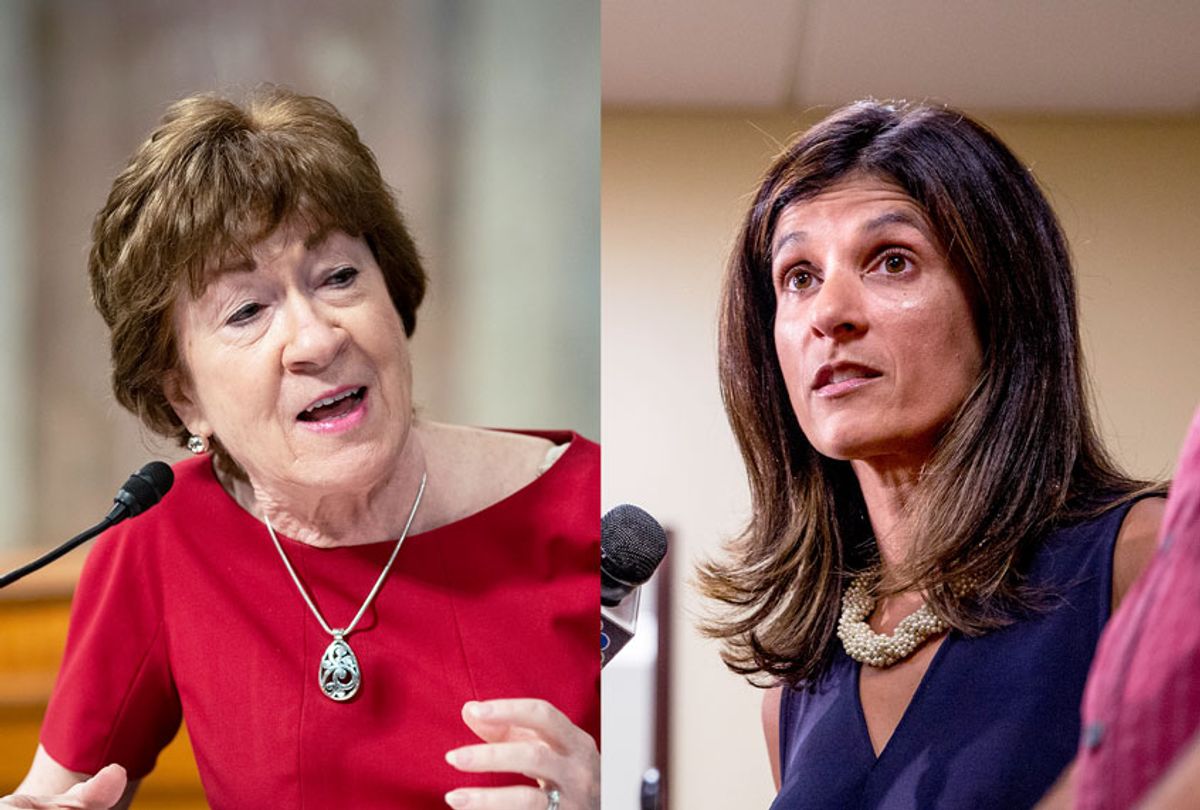"The tide has turned" on embattled Sen. Susan Collins, R-Maine, according to an analyst from Quinnipiac. A new survey released this week by the non-partisan pollster found the incumbent senator trailing Maine Speaker of the House Sara Gideon, her Democratic challenger, by 12 points.
"The tide has turned on Senator Susan Collins, who was so popular in Maine that she won nearly 70% of the vote the last time she ran," Quinnipiac University Polling Analyst Mary Snow said. "Likely voters are sending the message that there's no 'middle of the road' when it comes to President Trump, who is deeply unpopular in the state."
The poll, which was conducted before and after this weekend's first debate in the much-watched Senate race, found that 89% of the state's likely voters have already made up their minds. Meanwhile, 10% of likely voters could swing in either either direction. Gideon posted a 5-point lead in a Bangor Daily News poll sampled one month earlier.
The Bangor poll included another statistic possibly unfavorable to Collins: Green Party Senate candidate Lisa Savage polled at about 6%. In any other tight race, a Green Party candidate could a spoiler for Democrats. But in Maine's unique ranked-choice voting system, voters' backup choices come into play if no candidate earns a majority of votes outright. Savage voters are more likely to rank Gideon as their second choice.
Also likely troubling for the Collins campaign is a significant negative favorability rating — 43%-51%. Moreover, voters believe Gideon is honest by a 49%-33% margin, while Collins posted a 48%-42% deficit in the category.
While the cause of the divergence remains unclear, new reporting on Collins has recently raised questions about possible corruption. Last week, Salon exclusively reported that the American Democracy Legal Fund (ADLF) had sent a letter to the U.S. Senate Ethics Committee two days ahead of the debate — and one day before Quinnipiac began its poll — requesting an investigation into allegations that Collins used her office to financially benefit her husband, and subsequently, herself.
The charges were informed by a recent HuffPost article reporting that Collins had advocated and voted for policies benefiting her husband's consulting and lobbying business. Salon also revealed that the value of some of his investments as much as doubled following Collins' vote in favor of the Republican Party's 2017 tax bill, according to financial disclosures.
Asked whether the candidates cared about average people, voters said Gideon does by a 60%-27% margin. Meanwhile, Collins found herself seven points in the red: 51%-44%.
The Cook Political Report currently marks the race as a "toss-up."
Democrats see Maine as one of a handful of flippable GOP seats which could open up a path to regaining control of the Senate. And conservative spending in the state suggests that Republicans may see things similarly: Organizations such as the Federalist Society have invested heavily in Collins, while on the other side, the influential Republican-led never-Trump Lincoln Project has done the same.
A dark money group affiliated with Senate Majority Leader Mitch McConnell, R-Ky., and election strategist Karl Rove has dumped millions into the battle since January. (That same month, Collins knocked McConnell out for the top slot in public-opinion polling as the most unpopular member of the U.S. Senate.)
A sizable chunk of those Republican efforts aim to divorce Collins from Trump in the minds of voters without alienating enthusiasm from the president's supporters in the state. Collins' own team has used a similar approach.
For instance, Collins skipped a tour of the state with Trump amid the twin crises of the coronavirus pandemic and nationwide reckoning on race in the wake of the deaths of George Floyd and Breonna Taylor. Though Trump has endorsed Collins, the senator has declined to say whether she will in turn endorse the president. Last month, Collins' campaign edited Trump signage out of an ad.
Instead, Collins has leaned heavily on state interests in her ads, often in the form of video testimonials. But a Salon report in July revealed that more than 20 of those testimonials, packaged as "regular" Mainers, came from current or former elected Republican officials and Collins staffers.



Shares